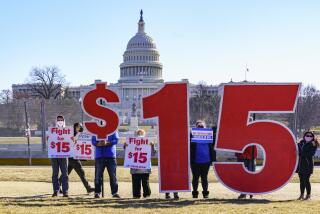Should minimum wage be linked to inflation? An Oregon case study
NEW YORK -- As the stock market continues to trend relentlessly upward, calls to raise wages for those at the bottom of the pay scale are becoming louder. After months of protests and marches, Iowa’s Sen. Tom Harkin and California Rep. George Miller introduced a bill to tie the minimum wage to inflation, and various groups have responded in support and protest of the bill.
But as a Senate Committee held a hearing Thursday on the Fair Minimum Wage Act of 2013, it became evident that what you think about the proposal might be related to what you think about the state of Oregon.
In 2002, the state passed a bill indexing the state’s minimum wage to the Consumer Price Index, which measures changes in the prices of goods and services purchased by households. That means Oregon’s minimum wage is now $8.95 an hour, higher than the federal minimum wage of $7.25. Oregon is relevant because the Harkin-Miller bill would tie future minimum wage increases to the cost of living.
Have the changes to the minimum wage been a good or bad thing for the blue state? That depends on who you ask.
Brad Avakian, the Oregon Labor Commissioner, says it’s been good for the state’s economy.
“We’ve made sure that workers don’t lose ground as the costs of everyday goods increase,” he said, in prepared testimony. “Virtually every dime that comes through a higher minimum wage is reinvested in the local economy, when the worker buys groceries, gas, clothes, school supplies and other essentials.”
Oregon’s law does not allow for a drop in wages when the CPI decreases, as it sometimes does during a recession. But it also hasn’t led to big increases, he argued. The largest increase in the decade since Oregon increased its minimum wage was $0.45 in 2008, a 6% increase.
But testimony from the National Restaurant Assn. makes the case that Oregon’s minimum wage increase actually hurt the state’s economy. That’s because, it says, the minimum wage forced employers to lay off workers -- the average number of workers in Oregon’s restaurants has steadily declined from 16.4 workers per establishment in 1996 to 13.8 workers in 2011. Overall, U.S. restaurants employ an average of 16.9 workers per establishment, the same level as 1996.
If Oregon’s employment levels had remained at 1996 highs, the state would employ 23,500 more people, according to testimony by Mel Sickler, a Cinnabon franchisee who spoke on behalf of the National Restaurant Assn.
“If this legislation were to become law, it would create a new hardship, particularly on small businesses, at a time that many of us are attempting to contribute to economic and job growth in a weak economy,” he said.
But some economists differ. The reason job numbers declined in Oregon, but not elsewhere, has nothing to do with the minimum wage increase, said Arindrajit Dube, an assistant professor at the University of Massachusetts who has studied the minimum wage. While economic studies at one time showed some states that raise the minimum wage lose jobs, researchers now blame those job losses on regional factors. States in the West and Northeast have had lower growth in demand for minimum-wage workers, and so lower job numbers.
That’s why many economists have come around to supporting raising the minimum wage, Dube said. After all, had the minimum wage kept up with productivity, it would have been $22 an hour in 2011. Even the Harkin-Miller bill wouldn’t raise it that much. In the equivalent of today’s dollars, the bill would raise the minimum wage to $9.38 by 2016; that’s back to 1978 levels, but nothing near the 1968 high, which was the equivalent of $10.60 today. Overall, workers who are paid more stay on the job longer, which in turn increases productivity, he said.
Many economists think Oregon’s minimum wage increase hasn’t hurt the state. Whether they can convince others remains to be seen. After all, it’s taken awhile for the profession to come around.
“While 20 or 30 years ago most economists believed that minimum wage increases invariably cause some job loss, as the data has come in, the profession has updated its beliefs,” Dube
ALSO:
Low wage workers turning to voters for pay increases
Push for minimum wage hike intensifies as workers ranks swell
Rejecting industry dogma, Costco backs call to lift minimum wage
More to Read
Inside the business of entertainment
The Wide Shot brings you news, analysis and insights on everything from streaming wars to production — and what it all means for the future.
You may occasionally receive promotional content from the Los Angeles Times.











